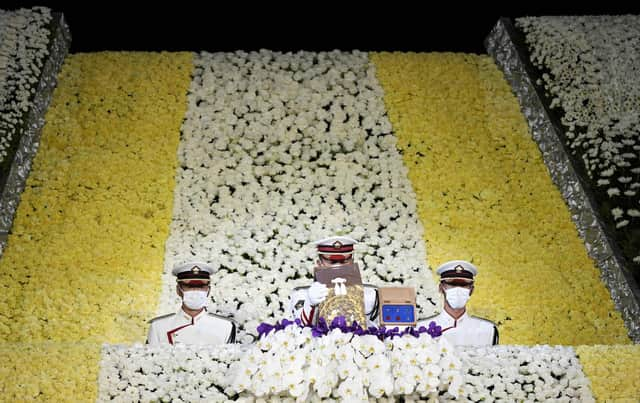Japan’s former leader Shinzo Abe honoured at divisive state funeral


Prime minister Fumio Kishida has said the publicly financed ceremony was a deserved honour for Japan’s longest-serving modern political leader, but it has deeply split public opinion and was met with angry protests.
The funeral, attended by US vice president Kamala Harris, Japan’s crown prince Akishino and other foreign and Japanese dignitaries, began with Mr Abe’s widow, Akie Abe, in a black formal kimono, walking slowly behind Mr Kishida into the funeral venue, carrying the urn containing his ashes in a wooden box wrapped in a purple cloth with gold stripes.
Advertisement
Hide AdAdvertisement
Hide AdSoldiers in white uniforms took Mr Abe’s ashes and placed them on a pedestal filled with white and yellow chrysanthemums and decorations.
Attendants stood while a military band played the Kimigayo national anthem, then observed a moment of silence before a video praising Mr Abe’s tenure.
Footage included his 2006 parliamentary speech vowing to build a “beautiful Japan” and his speech at the US Congress in 2015.
It also included his visits to disaster-hit northern Japan after the March 2011 tsunami, and his 2016 Super Mario impersonation in Rio de Janeiro to promote the 2020 Tokyo Olympics.
Mr Kishida, in his 12-minute eulogy, praised Mr Abe as a politician with a clear vision for post-war economic growth and development of Japan and the world, and promoting the concept of a “free and open Indo-Pacific” as a counter to China’s rise.
Mr Kishida, as he looked up a large photo of a smiling Mr Abe, said that as a fellow politician elected in the same year in 1993, Mr Abe’s loss came too soon.
“You were a person who should have lived much longer,” Mr Kishida said. “I had a firm belief that you were to contribute as a compass to show the future direction of Japan and the rest of the world for 10 or 20 more years.”
Mr Abe was cremated in July after a private funeral at a Tokyo temple days after he was assassinated while giving a campaign speech on a street in Nara, a city in western Japan.
Advertisement
Hide AdAdvertisement
Hide AdTokyo was under maximum security for the state funeral, especially near the Budokan hall venue.
At a peaceful protest march in the city centre, hundreds of people marched toward the hall, some banging drums and many shouting or holding banners and signs stating their opposition.
“Shinzo Abe has not done a single thing for regular people,” Kaoru Mano said.
The government maintains that the ceremony is not meant to force anyone to honour Abe.
But the undemocratic decision to give him the rare honour with imperial ties, the cost, and controversies about his and the ruling party’s ties to the ultra-conservative Unification Church, have fuelled controversy.
Japan’s main political opposition parties boycotted the funeral, which critics say is a reminder of how pre-war imperialist governments used state funerals to fan nationalism.
Opponents say holding a state funeral for Mr Abe is equivalent to an endorsement of ruling party ties to the Unification Church.
